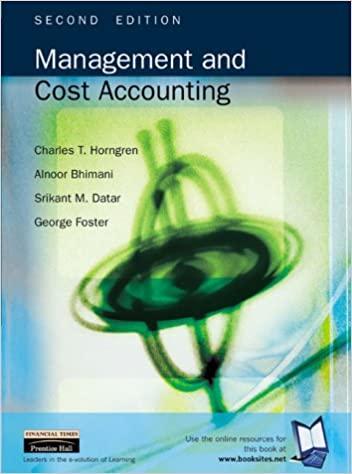Question
An auto dealership is trying to determine the appropriate price for its new Hybrid car based on customer economic value as well as its internal
An auto dealership is trying to determine the appropriate price for its new Hybrid car based on customer economic value as well as its internal costs. Given a high level of brand loyalty among the customers of this brand, the assessment of economic value is to be carried out with respect to the same brand that has either a hybrid or conventional engine. Here is the side-by-side performance comparison of two otherwise identical models:
| Car with conventional gas-powered engine | Car with hyrid engine | |
| Price to Buyer | $26,000 | TBD |
| Gas Mileage (MPG) | 25 City/40 Hwy | 50 City/50 Hwy |
| Typical Ownership | 8 Years | 8 Years |
| Yearly Maintenance Costs (Avg.) | $700 | $500 |
| Yearly Insurance Cost | $800 | $500 |
| Tax Credit | $0 | $3,000 |
| Trade-in Value at 8 Years | $4,000 | $5,000 |
Other Information: The Tax Credit is only given one time. The price of gasoline is $4.00 per gallon. There are two segments of customers: Highway drivers and City drivers. Both types drive 20,000 miles each year. The Highway segment does 25% city driving and 75% highway driving. The City segment does 75% city driving and 25% highway driving. You do NOT need to convert numbers to Net Present Value, i.e., you can assume there is no discounting of future cash flows.
1. What is the Customer Life Cycle Cost (LCC) for a Highway driver who purchases the conventional engine? Remember that LCC is the net total amount paid by customer over the life of the product (which is 8 years in this market setting), including the initial price and all other necessary service and inputs. Hint: you need to account for the cost of gas, which depends on the total number of gallons needed to travel on city streets and on highways. You do not need to account for the time discount of money.
2. What is the LCC for a City driver who purchases the conventional engine?
3. What is the LCC for a Highway driver who purchases the hybrid engine? Hint: Label the initial purchase price of this car as PH. Thus LCC will be a number + PH.
4. What is the LCC for a City driver who purchases the hybrid engine?
5. For a Highway driver, at what value of PH will the LCC for a conventional engine exactly equal the LCC for the hybrid engine? Note, this value represents the WTP of a Highway driver for a hybrid car.
6. For a City driver, at what value of PH will the LCC for a conventional engine exactly equal the LCC for the hybrid engine? Note, this value represents the WTP of a City driver for a hybrid car.
7. Suppose the rebate for a Hybrid car were $5,000 (instead of $3,000). What would now be the WTP of a Highway driver for a hybrid car?
What would now be the WTP of a City driver for a hybrid car?
Is the WTPs larger or smaller than you found in 5) and 6), respectively? Briefly explain why WTP changed in the direction it did.
8. Return to the assumption that the rebate is $3,000. But, now assume ownership lasts for 6 years instead of 8 years. What would now be the WTP of a Highway driver for a hybrid car?
What would now be the WTP of a City driver for a hybrid car?
Is the WTPs larger or smaller than you found in 5) and 6), respectively? Briefly explain why WTP changed in the direction it did.
Cost Structure for the Dealership
During a model year, the manufacturer ships 50 Hybrids to a dealership, at a wholesale cost of $32,000 per car. The dealership incurs a preparation cost of $4,000 per car that it sells. These costs are incurred only on cars that is sold by the dealership, i.e., the dealership can return any unsold cars to the manufacturer (and get the wholesale cost reimbursed) and the dealership doesnt have the expense of preparing cars that are unsold. The dealership incurs a fixed cost of $200,000 during the year for employee salaries and rents that is attributable to the hybrid cars.
9. If the price of the hybrid is set equal to the variable cost, what would be the price?
Assuming gas prices are $4 per gallon and ownership lasts for 8 years, would Highway drivers be willing to purchase at this price?
Would City drivers be willing to purchase at this price?
10. If the price of the hybrid is set equal to the average total cost, what would be the price?
Would Highway drivers be willing to purchase at this price?
Would City drivers be willing to purchase at this price?
11. Suppose there are 25 City drivers and 25 Highway drivers in the dealerships sales territory. What price should they charge for hybrid cars? Explain the rationale for your answer.
Step by Step Solution
There are 3 Steps involved in it
Step: 1

Get Instant Access to Expert-Tailored Solutions
See step-by-step solutions with expert insights and AI powered tools for academic success
Step: 2

Step: 3

Ace Your Homework with AI
Get the answers you need in no time with our AI-driven, step-by-step assistance
Get Started


